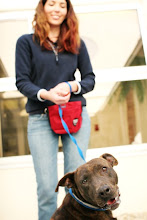 Unlike their feline counterparts, puppies must be shown much more than simply where to go to the bathroom. They must also learn when. Potty training can be the most frustrating part of puppy hood. Even when done correctly, this step in a dogs development takes time.
Unlike their feline counterparts, puppies must be shown much more than simply where to go to the bathroom. They must also learn when. Potty training can be the most frustrating part of puppy hood. Even when done correctly, this step in a dogs development takes time.The first thing to remember is; always be Pro-active not Re-active! We want to prevent accidents, not wait for them to happen. YOU play the most important role in potty training your dog. Success or failure rides on your shoulders. You must be patient, determined and reliable.
Supervision is of utmost importance. Your puppy is like a small child and must be looked after at all times. If your puppy is always within sight, then you will never walk into your bedroom and find a 'surprise' waiting for you. I suggest physically attaching your puppy to your belt loop with a long leash. This way, where you go, so does puppy. Now, when you see your puppy sniffing, circling or squatting you will be right there to get them immediately outside.
The first few weeks of potty training are the hardest and most important. And don't blame the dog if you're lazy!
Adult dogs can be trained in the same manner as puppies, but have a greater bladder control. Puppies have to go potty when:
They wake up in the morning
30 mins after they eat
After play time
Whenever you leave
Whenever you return
And last thing before bed
Do not wait for your dog to 'tell' you they have to go out. Puppies usually don't know they have to go until the moment they do!
If this all sounds like a lot of work it's because it is!
Dogs like to sleep and eat in clean places. This is the primary reason why crate training can be so effective. Make sure to purchase a crate that your puppy can grow into, and block off the excess with cinder blocks. (Virtually indestructible.) We don't want your puppy using half of a large crate for a bathroom and half for sleeping. Your dog should have just enough room to stand up and turn around. In the crate should always be water, a sleeping pad and toys. Place the crate in a central location in your home. Crates should be used primarily for sleeping and eating; never punishment. Your dog should only be in the crate when you cannot supervise them.
Note: If your already potty trained dog begins having accidents in the house, take them to a vet right away, as they may have a UTI or other medical problem.
Make sure to clean up any accidents with a non ammonia based product. (Baking soda and white vinegar work well.) You need to get out all of the smell, because to a puppy, if it smells like a bathroom, it is a bathroom.
If you catch your puppy in the act, pick them up and rush them outside ASAP! We want the puppy to feel grass under their feet while they are relieving themselves, not your carpet!
Don't give your puppy the run of the house too soon. Block off specific areas with baby gates during the transition period.
Come back next time for Potty Training 102!





No comments:
Post a Comment